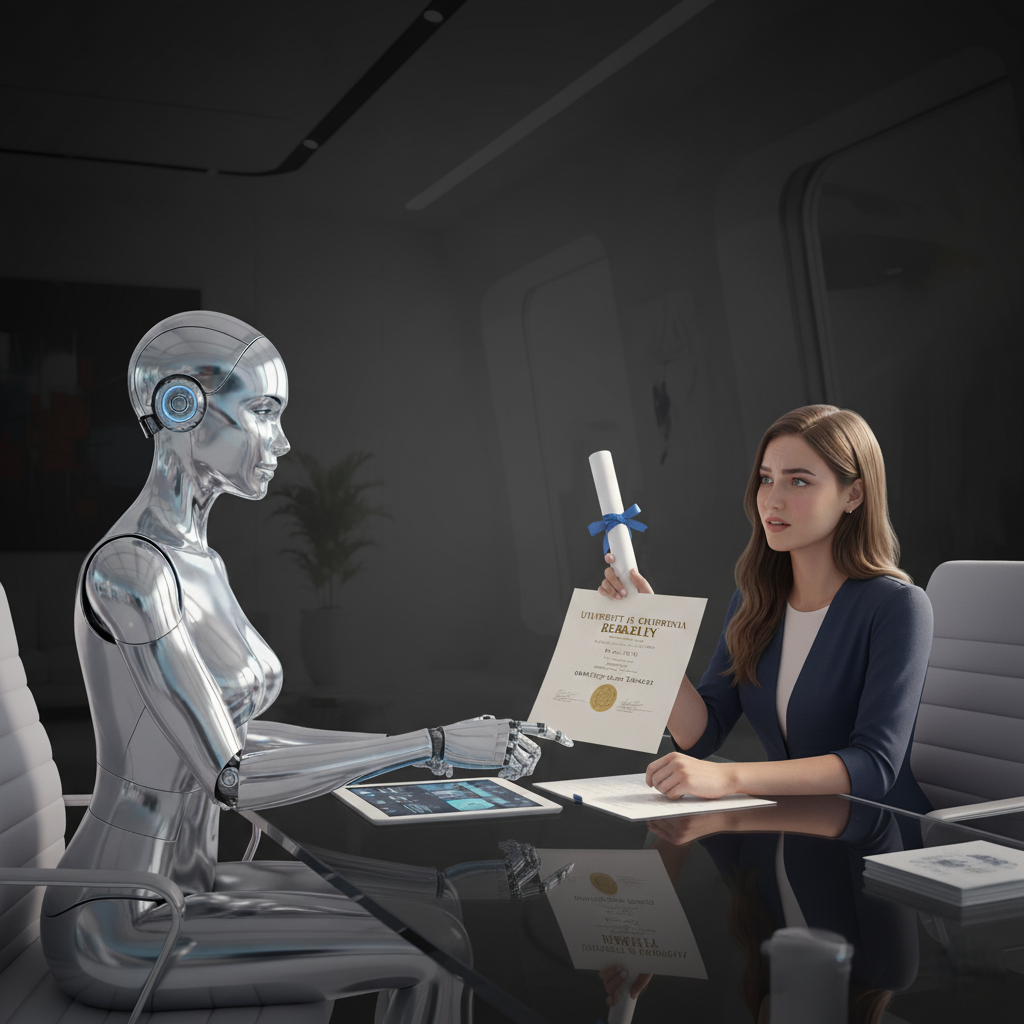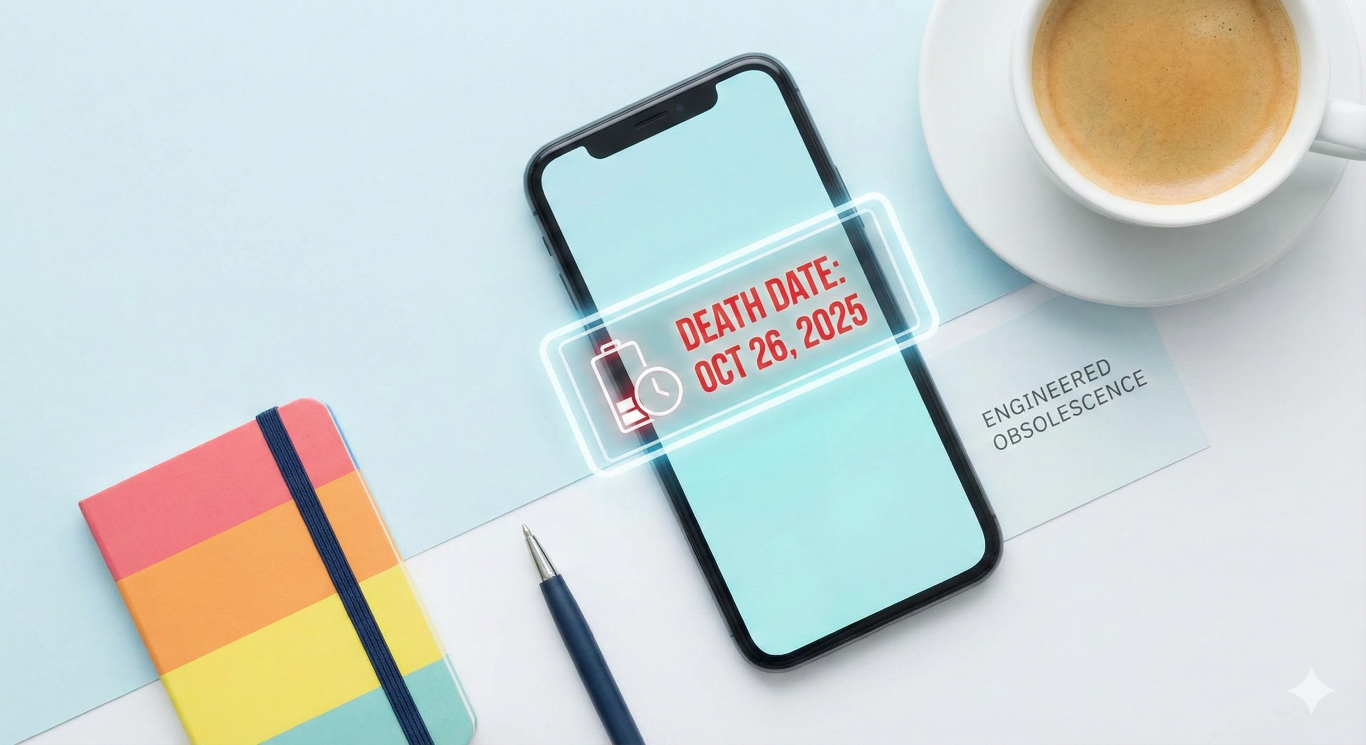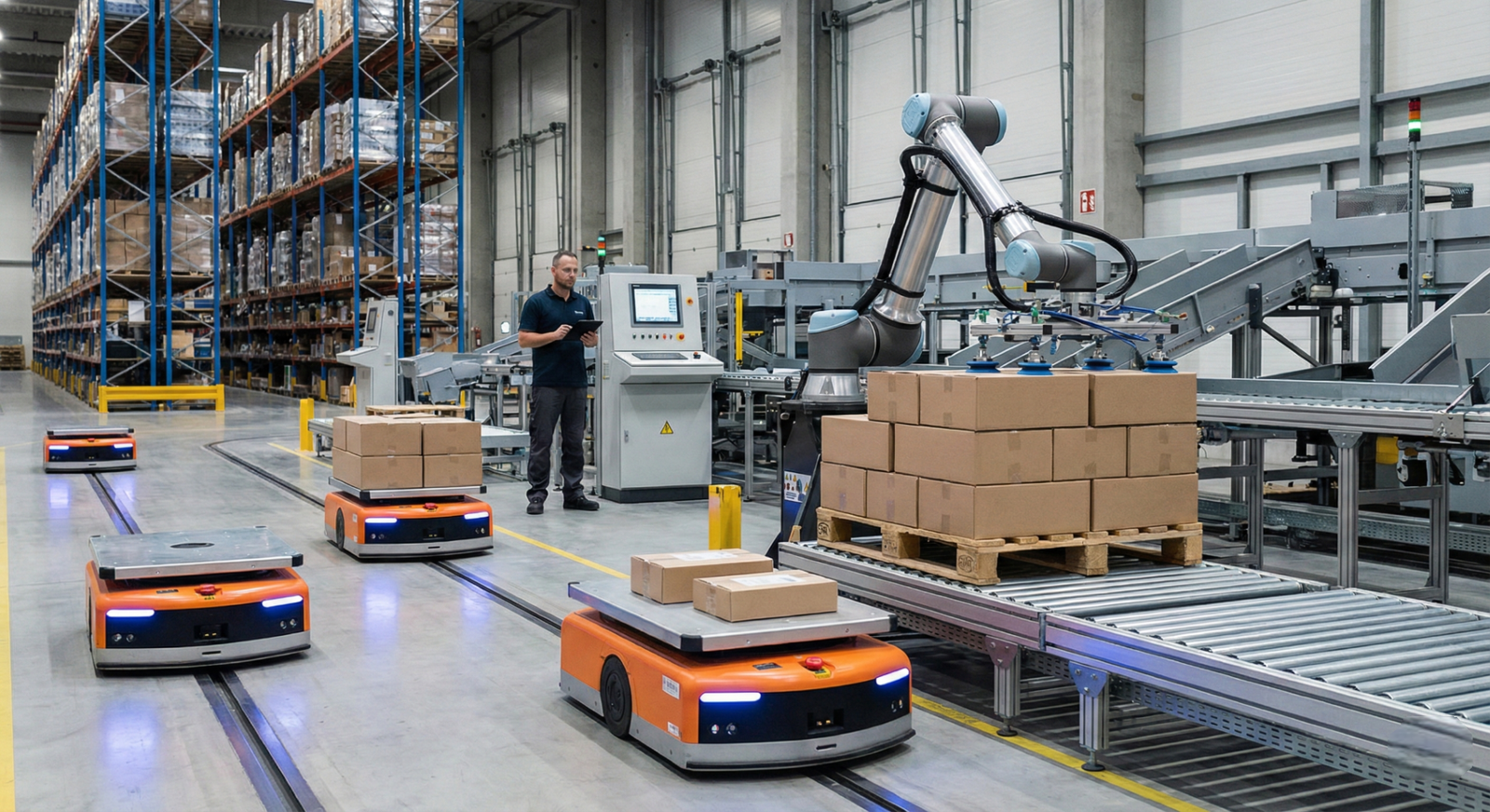Key Takeaways
- AI is actively replacing entry-level and routine cognitive jobs (like customer service and basic coding) as companies seek to automate tasks.
- Employers are moving to skills-based hiring, valuing practical abilities, portfolios, and certifications over traditional academic credentials alone.
- Workers must embrace continuous learning, soft skills (like critical thinking and adaptability), and the ability to work with AI, not against it.
The AI Shift
The modern workplace is changing faster than ever before. We often hear warnings about Artificial Intelligence (AI) taking over jobs in the future. However, statistics show this is not a future threat—it is happening right now. AI job displacement is already a fact, reshaping which skills are valuable and who gets hired. This shift forces us to re-examine the traditional value of a four-year college degree. While degrees still offer long-term value, they are increasingly seen by employers as a snapshot of past knowledge, not a guarantee of job readiness today. The new reality demands a focus on constant learning and demonstrable skills.
The New Reality of Work: Not a Threat, But a Transformation
It’s easy to view AI as an enemy of the workforce, but the full picture is more complex. AI technology is not just eliminating jobs; it is fundamentally transforming how work is done. It automates repetitive tasks—the tasks that make up many entry-level positions. This transformation is accelerating, creating new types of roles that require human oversight, ethical judgment, and critical thinking abilities that machines cannot replicate.
AI Job Displacement: What the Statistics Show is Already Happening
The data is clear: AI is actively replacing workers. Globally, millions of jobs have already been directly displaced by AI-driven technologies. While AI also creates new roles in areas like data science and AI operations, the net effect right now shows a significant number of people losing their current positions due to automation. This reality is pushing businesses to adopt skills-based hiring models, making practical ability the most important currency in the job market.
The Data on Displacement: AI Is Already Taking Jobs
The idea that AI is only coming for manufacturing jobs is outdated. Generative AI tools are now highly effective at performing tasks once reserved for white-collar workers. This includes drafting emails, writing basic code, conducting research, and analyzing data. This capability means a growing number of professional jobs are now vulnerable.
Who is Being Hit Hardest by AI Automation?
AI is not hitting all age groups or professions equally. The greatest impact is seen among younger, mid-career workers and those in occupations that have quickly embraced generative AI. These trends suggest that people just starting their careers are facing the toughest job market shift.
The Entry-Level Crisis: The disappearing bottom rung of the career ladder
Historically, college graduates started on the bottom rung of a career ladder, performing simple tasks to gain experience. This rung is disappearing. Entry-level jobs, which are often the most exposed to automation, are especially at risk. For example, between 2019 and 2024, there was a major decline in new roles available for people with less than one year of experience at top tech firms. This means that even with a strong degree, new graduates are struggling to get a foothold.
Exposed Occupations: White-Collar Jobs at Risk (e.g., Data Entry, Customer Service, Basic Coding)
Jobs that involve routine or high-volume data processing and content generation are seeing the highest risk of AI automation. This includes:
- Basic Software Development: AI can write, test, and debug simple code.
- Data Entry and Analysis: AI can process huge datasets faster and with fewer errors.
- Customer Service and Support: Chatbots and AI systems handle initial inquiries and simple transactions.
- Paralegal Work: AI can review vast amounts of legal documents quickly.
The Scale of the Change: Present and Projected Job Losses
The scale of AI job displacement is massive. Experts estimate that hundreds of millions of full-time jobs globally could be replaced by 2030. While some roles will be created in tech, data, and AI implementation, the overall transformation requires a massive reskilling effort from the existing workforce.
Current Displacement Numbers
Statistics from the last few years show a direct link between the adoption of AI and job cuts in tech-exposed sectors. For instance, in 2025, tens of thousands of job cuts were directly attributed to the implementation of AI technologies within companies. Furthermore, the unemployment rate for young people in tech-exposed fields has risen significantly, showing that displacement is happening faster for those who are early in their careers.
Future Projections: Automation of 30% of U.S. Tasks by 2030
Looking ahead, the projections are even more drastic. By 2030, a significant percentage of all current tasks performed in U.S. jobs could be fully automated. More than half of all jobs will see fundamental changes due to AI integration. This means nearly every worker will need to adapt, whether by learning new AI tools or focusing on uniquely human skills like complex problem-solving.
The College Degree Paradox: Why Past Knowledge Isn’t Enough
The value of a college degree is caught in a paradox. On one hand, data clearly shows a degree leads to better outcomes over a person’s entire working life. On the other hand, a degree is no longer the automatic key to getting the first job, leading many young people to question its worth.
Lifetime Earnings and Unemployment Rates: The long-term security
Even today, a college degree is an investment that pays off over time. Graduates earn significantly higher median lifetime earnings than those with only a high school diploma. They are also much less likely to be unemployed than their non-degreed peers. The degree provides a valuable foundation of knowledge and research skills that confer long-term economic security.
The Soft Skills Advantage: Critical Thinking and Adaptability
A university education is designed to teach more than just facts. It trains students in critical thinking, complex problem-solving, and communication—the soft skills that are difficult for AI to replicate. These are the highly valued abilities that help a worker adapt quickly when an industry is disrupted. Some non-STEM majors, like philosophy or history, actually produce graduates who possess some of the most sought-after adaptability skills.
The Problem: A Snapshot of Past Knowledge
The critique that a degree is a snapshot of past knowledge has a strong basis in the reality of today’s fast-moving industries.
Rapid Skill Obsolescence: How AI changes required skillsets quickly
The technical skills taught in a college course today might be partly outdated by the time a student graduates four years later. The knowledge base in fields like coding, digital marketing, and data science is changing almost every year due to AI advancements. Employers now need workers with the skills of today, not the skills taught a few years ago. Workers can expect a large percentage of their existing skillset to become transformed or irrelevant within the next decade.
Gen Z’s Perspective: Doubts about ROI (Return on Investment)
The generation currently entering the workforce, Gen Z, is the most skeptical about the value of a degree. Many feel their degree is a “waste of money,” especially when they find themselves working in jobs that technically do not require a degree one year after graduation. The feeling that AI has made their degree irrelevant is high, fueled by the rising costs of education and the competitive entry-level crisis.
The Rise of Skills-Based Hiring: The New Job Market Currency
The biggest change in hiring is the focus shifting from credentials (what degree you have) to competence (what you can actually do). This is known as skills-based hiring, and it is rapidly becoming the norm.
Why Employers are Dropping Degree Requirements
Solving the Talent Gap: Finding candidates with current skills
Employers are struggling to find people with the exact skills needed for modern jobs, particularly in tech. They realize a degree does not always mean a candidate possesses the most current, specific knowledge required. By dropping degree requirements, companies can tap into a wider pool of talented people who gained their skills through coding bootcamps, online courses, or practical experience.
Prioritizing Skills Over Credentials: Case Studies from Top Companies
Many major companies are publicly adopting a skills-first approach. They are removing formal education requirements for many key roles. They use AI-powered assessments and skills tests to identify candidates with real potential, rather than simply screening by GPA or graduation status. This shift means that demonstrating your abilities is more important than the name of the college on your resume.
What Employers Actually Look For
In the skills-based hiring world, the focus is on a mix of technical knowledge and enduring human abilities.
In-Demand Technical Skills: Data Science, AI Tools, Cybersecurity
Employers look for measurable technical abilities that are relevant today. This includes expertise in using AI tools and platforms, cloud computing, cybersecurity, and data analysis. The ability to work with AI—to prompt it effectively, to correct its output, and to use it for acceleration—is a crucial technical skill.
Critical Soft Skills for the AI Era: Problem-Solving, Creativity, and Resilience
As AI automates routine tasks, the uniquely human soft skills become more valuable. These include:
- Complex Problem-Solving: Tackling issues that machines cannot figure out.
- Creativity and Innovation: Developing new ideas and strategies.
- Resilience and Adaptability: Being able to quickly learn new tools and pivot when the job changes.
Tests for these soft skills are now among the most popular evaluation methods used by employers.
Thriving in the AI-Augmented Future
The successful worker in the AI era is not someone who tries to compete with AI, but someone who learns to partner with it.
The Human-AI Partnership: Augmentation Over Automation
Instead of focusing on AI automation (machines replacing people), workers must aim for AI augmentation (machines helping people work better). AI tools can handle the drafting, research, and analysis, freeing up the human worker to focus on strategy, empathy, relationship-building, and critical oversight. Learning how to be an effective partner to AI is the new job security.
Strategies for Continuous Learning and Upskilling
Since skills have a shorter lifespan than ever before, continuous learning is no longer optional—it is required.
Embracing Certifications and Micro-credentials
Professional certifications, like those offered by major tech companies for cloud services or data analysis, are incredibly valuable. They prove a person has up-to-date, job-specific skills. Micro-credentials are short, focused educational programs that quickly train people in a single, high-demand skill, making them highly effective tools for upskilling.
Building a Skills Portfolio: Show, Don’t Just Tell
In a skills-based world, demonstrating what you can do is key. A strong skills portfolio—which might include real-world projects, code repositories, design mockups, or successful campaigns—is often more persuasive than a list of courses on a transcript. This portfolio serves as proof of current ability, overcoming the weakness of a degree being a “snapshot of past knowledge.”
Conclusion: Adaptation is the New Job Security
The statistics are undeniable: AI job displacement is a current reality, especially for entry-level positions. The college degree is not obsolete; it still provides a crucial foundation of knowledge and lifetime earning benefits. However, its immediate power as a hiring credential has faded, replaced by an employer’s need for demonstrable, current skills. Success in the future workforce depends on a strategic approach: combine the critical thinking taught in higher education with a commitment to continuous learning, upskilling, and becoming a skilled partner to AI tools. Adaptation is the new job security.
Frequently Asked Questions (FAQ)
- Will AI replace all human jobs?
No. While AI will automate many routine tasks, it is highly unlikely to replace all human jobs. Jobs requiring high levels of complex reasoning, creativity, emotional intelligence, leadership, and ethical judgment are safe for the foreseeable future. AI is better viewed as a tool that will change how nearly every job is done, rather than a replacement for all jobs.
- What is the difference between AI Automation and AI Augmentation?
AI Automation is when a task or an entire job is taken over and performed by an AI system (e.g., a chatbot replacing a customer service agent). AI Augmentation is when AI tools work with a human worker to enhance their performance (e.g., a writer using a generative AI tool to draft outlines faster, allowing them to focus on editing and improving the final copy). Augmentation is the path toward job security.
- How can I make my college degree more valuable in the AI job market?
To increase the value of your degree, you must supplement it with current, practical knowledge.
- Focus on in-demand skills like data analysis and AI tool proficiency.
- Seek out internships or real-world projects to build a strong skills portfolio.
- Prioritize courses that teach critical thinking and problem-solving, which are skills difficult for AI to automate.
- Embrace certifications and continuous learning programs even after graduation.





